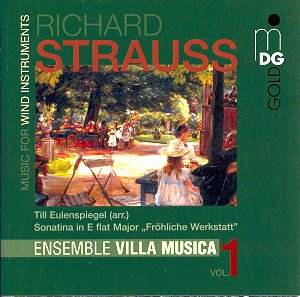Strauss’s
own comment at the end of his E flat Sonatina, AV143, says it
all: ‘Happy workshop. To the … divine Mozart at the end of a life
filled with gratitude’. Strauss’s tribute to the earlier composer
of so many inspired Divertimenti is clear. Also, the fluency
of composition and the evident joy in contentment that shines
through every note speaks, indeed, of a happy workplace.
That
said, this Sonatina does not quite represent the autumnal serenity
(an altogether stronger word than ‘contentment’) that Strauss
showed in, say, the Oboe Concerto, even in its Andantino (marked
also ‘sehr gemächlich’: very leisurely, and played with gorgeous
instrumental interplay here by the Ensemble Villa Musica). Rather,
it is uplifting chamber music of the highest order. The opening
Allegro con brio is jolly, busy and echt-Straussian. There
is plenty of energy in the Ensemble Villa Musica’s playing: they
project a youthful vigour and enthusiasm. A special mention should
go to the first bassoonist for some lovely contributions.
If
the Menuett does not bring a smile to your face, it is time to
reach for the Prozac. It is only in the finale (the longest movement,
at 16’14) that Strauss becomes a little verbose. The melodrama
of the Andante introduction comes across well, however.
David
M. Carp’s arrangement of Till Eulenspiegel for wind quintet
and piano is an intriguing curio. No substitute for the original,
of course, but it will nevertheless bring much joy (and not a
few raised eyebrows: the very opening phrase is for unaccompanied
piano!). The horn call survives intact (the wonderful Frank Lloyd
does the honours here, and he is magnificent - rock-solid over
the wide range required, pedal notes equally as full as those
in the higher register). Heard in this incarnation, Till’s
comedic-dramatic side comes easily and naturally to the fore:
in fact, he seems a true Germanic commedia dell’arte figure!.
There is a real sense of fun, not to mention pure cheek: pecking
oboe (Ingo Goritzki) and clarinet (Ulf Roderhäuser) and capricious
flute (Jean-Claude Gérard) provide much delight along the
way.
True,
some moments cannot be compensated for: the piano’s substitution
for the solo violin’s scalic descent hardly works in the same
way (5’12); similarly, the piano’s role as ominous ‘executioner’
is very obviously a reduction. Nevertheless, the climax is exciting,
simply because of the sheer amount going on simultaneously.
For
a long time the Netherlands Wind Ensemble under Edo de Waart has
held sway as far as the Sonatina is concerned (Philips Duo 438
733-2). This new version provides a viable and thoroughly enjoyable
alternative. Volume 2 is to be eagerly awaited.
Colin
Clarke
